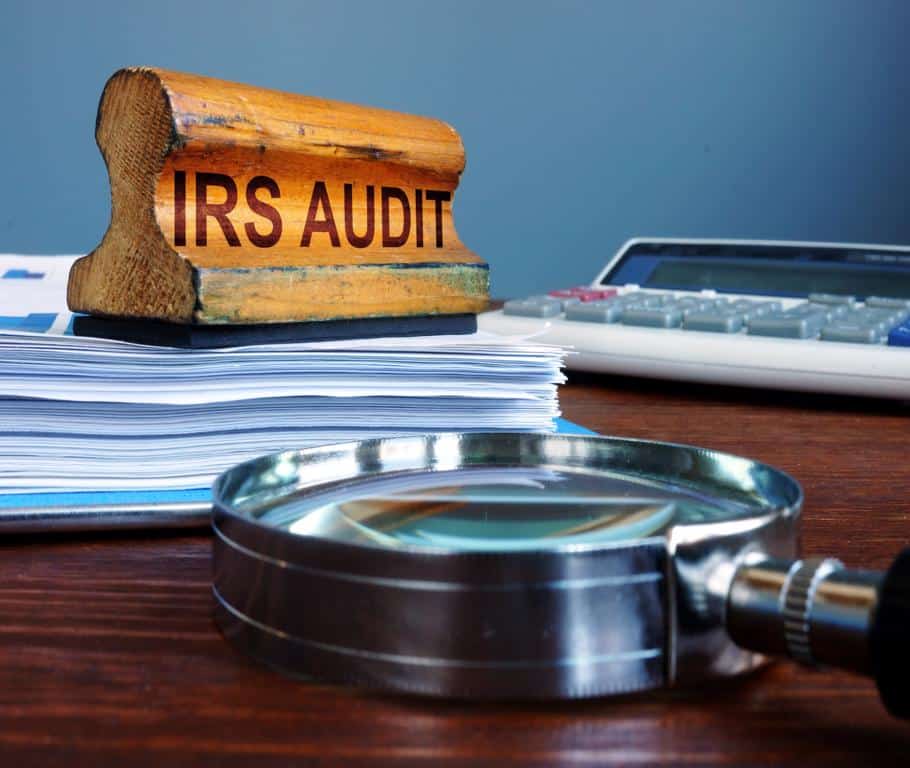The Internal Revenue Service (IRS) carries a strict reputation as the nation’s accumulator of taxpayer dollars and the chief enforcer of the United States’ tax code.
In 2018, The IRS performed approximately 892,197 audits.
Due to the IRS’s frightening reputation, an audit is treated with an immense sense of urgency and stress by both taxpayers and business owners.
As such, both parties face a unique situation of avoiding an audit from the IRS at all costs. To stay compliant with the nation’s tax code and avoid the enduring process of a tax audit, here are several red flags you should look for.

Instant. Simple. Smart We Make Insurance Easy
Instant. Simple. Smart
We Make Insurance Easy
Find Out How Much You Can Save Today

Take the first step towards peace of mind with LoPriore’s team. Experience tailored insurance solutions that fit your lifestyle and budget. Get your free, no-obligation quote today and see the difference expertise makes!
Below, you can also find more information on how to navigate an IRS audit.
What is a Tax Audit?
An audit is simply a comprehensive examination and review of a person or business owner’s tax return.
The IRS usually performs a tax audit, but a state authority can also carry it out. The purpose of an audit is to determine if the amount or other pertinent information on a tax return is accurate.
This examination can also be used as a precursor to a criminal investigation when deciding if a person knowingly cheated on their taxes or defrauded the IRS.
How Does a Tax Audit Work?
Every year, the IRS gets copies of tax forms, such as 1099s and W2s. The IRS then uses computers to match the income amounts on these forms with your return.
If the numbers don’t add up, you could trigger a tax audit. Thus, the IRS will request to examine your income more closely.
10 Tax Audit Red Flags to Consider
Avoiding a possible tax audit doesn’t have to be a challenging process. There are several red flags you can anticipate to prevent the occurrence of an audit.
Here are 10 particular tax audit red flags to consider:
1. Making Too Much Money
The IRS has admitted to performing more audits as taxpayer income increased over the years. This seems to be very concerning if you plan to expand into a new tax bracket this year.
Fortunately, you may not be affected if you reside out of the nation’s 1%. In previous years, the IRS has received backlash for targeting lower-income individuals who redeem refundable tax credits.
Now, the IRS has seemed to focus more on wealthy individuals and profitable businesses exceeding the seven-figure range. Everyone wants to make more money.
However, it’s important to remember that when you make a lot of money, the IRS will naturally come calling. If you’ve abided by the law, you should have nothing to worry about.
2. Claiming to Many Deductions
The IRS is savvy enough to know when a person or business owner is claiming far too many deductions in an effort to cheat their taxes. If you have substantial proof to validate your deduction or credit, you should provide it.
Otherwise, you should consult with your accountant before moving forward. In the end, you should never get into the habit of paying the IRS more than what you owe.
3. Not Reporting all of Your Taxable Income
Taxpayers should report all taxable income they receive, whether it’s from side hustles or simple service exchanges. If you receive income from:
- Dog sitting
- Tutoring
- Selling items on Amazon
- Giving guitar lessons
- Repairing cars or household appliances
Then, you need to report this income on a 1040 return, even if you never receive a 1099 form. Some side hustles may seem trivial, and you may not think this is necessary.
However, the IRS is always watching.
4. Reporting Abnormal Charitable Donations
This is an old-fashioned method of cheating taxes, and the IRS has fully caught on. Still, any charitable contribution is a great tax write-off.
If your contribution is abnormally large compared to your income, then a red flag can be raised by the IRS.
The IRS has built a system that determines the average charitable donation amount for people in your tax bracket. For example, if you make $50,000 a year and give $30,000 to a charity, the IRS will know that you must have received a large sum of money elsewhere.
If you didn’t report that type of income, then you could be charged with tax fraud.
5. Not Filing Taxes
This is a clear red flag that can be raised when a taxpayer knowingly refuses to file their taxes. Shockingly, the IRS has been very lax on individuals who don’t file their taxes.
The agency has also been under heavy fire from lawmakers and taxpayers for not being equitable to people who evade their taxes. As a result, the IRS has begun to surveillance individuals who earn more than $100,000 a don’t report their taxes.
When these people are found, IRS agents will contact them and strike a collective agreement to help them comply with the law. After a refusal, the IRS will enforce liens, levies, heavy fines, and possible criminal charges.
Currently, it’s difficult to pin down citizens who earn less than $100,000 and don’t file their taxes.
6. Deducting Entertainment Expenses
Many business owners have always written off meals, travel, and other items as deductions. Unfortunately, excessive use of this tactic can spawn an audit from the IRS.
Particularly, the IRS looks for abnormally large write-offs. In other words, if a deduction’s amount looks to be suspiciously higher than any restaurant or hotel bill, the IRS will notice.
The IRS has stringent rules about what constitutes a valid entertainment expense. To meet these standards, you must keep detailed records that indicate:
- The amount of the meal or bill.
- The restaurant, hotel, or place of business.
- The people are attending the place of business with you.
- The purpose of the meeting or gathering.
- Receipts over $75.
- Travel expenses when staying away from home.
If you don’t have these records, then don’t bother making a deduction. Business owners can be certain that the IRS will notice if they deduct fees for golfing or sporting events when meeting with clients.
These fees are considered to be in the line of leisure rather than a legitimate deduction. The landmark tax reform law in 2017 prohibited all deductions for unnecessary entertainment expenses.
7. Not Reporting Personal Use of a Business Vehicle
Anytime you use a business vehicle, you’re required to file a Form 4562, indicating a percentage of the vehicle was used to accomplish “business” tasks.
Never make the mistake of claiming that you used 100% of your company’s car on business affairs. The IRS knows that no one can claim 100% business use of a vehicle, especially if they don’t even own a personal car.
Because of this, be mindful to keep detailed records of your mileage and logs for road trips. Sloppy records will only discredit your deduction and allow the IRS to audit you.
You should also avoid claiming deductions for insurance, car repairs, etc. The IRS will easily disallow these deductions.
8. Making a Home Office Deduction
The year 2020 saw millions of Americans work from home due to COVID-19. Many of these people would be thrilled to write off a few deductions for expenses relating to their home offices.
Unfortunately, this isn’t going to be possible for a lot of Americans. Before the 2017 tax reform law, many people could deduct miscellaneous office expenses.
Now, this benefit is only available to:
- Independent contractors and other self-employed people.
- Self-employed workers who use an office or space as their “place or business.”
- Those who own or rent a home.
There are two main methods for writing off office deductions:
- Indicate the actual costs of your home office using receipts or other verifiable documents.
- Deduct $5 per square foot of your office or the space you’re occupying for business. You can only claim a maximum total of $1,500.
9. Claiming Alimony as a Deduction
Fortunately for recent divorcees, alimony is a valid tax deduction. Any alimony paid using cash or check under a divorce agreement before 2019 can be deducted.
This is only under certain conditions. The divorce or separation agreement must explicitly state that the payments to the former spouse are “alimony.”
Also, the payments to the former spouse must end when the recipient dies. Most divorce agreements are in complete violation of these tax rules.
Consult with an account to learn more if your separation agreement is in the confine of these laws.
10. Not Reporting Gambling Wins and Losses
If you plan to play the slots this year or place a wager on horses, then you need to be prepared to give the IRS their share. Everyone who gambles must report their winnings on a 1040 form.
Casinos and other establishments will report their own business finances on a W-2G form. Therefore, the IRS will raise a red flag if you don’t report your winnings.
If you choose to deduct your gambling losses, then they must be to the same extent as your winnings. The IRS may perform an audit if they notice you’ve deducted a high amount in gambling losses but low gambling winnings.
This is considered suspicious behavior by the IRS.
How to Navigate a Tax Audit
Receiving an audit from the IRS doesn’t have to be a stressful situation. Audits usually come by mail. When the IRS requests to audit your taxes, keep these concepts in mind to mitigate the process:
Understand the Audit
- Mail audits are usually very brief and to the point. This will allow you to gather what the scope of the audit is about quickly.
- Field audits are more comprehensive and will require you to submit in-depth information about your finances.
- It’s recommended to hire a tax professional, such as a certified public accountant (CPA) or an attorney, to help you deal with this matter.
Respond to the IRS
- With your tax professional, set up a meeting with an IRS agent.
- Gather all of the information that was requested.
- If you are missing vital documents, reach out to the party to submit an affidavit instead.
Appeal if Necessary
- The IRS will either dispute your findings or approve them.
- You will receive a letter in the mail regarding the findings of the audit. This will effectively close the investigation.
- You have the choice to appeal the final decision by the IRS in the U.S. Tax Court.
Filing your Taxes vs. Hiring a Professional
Whether you choose to file your own taxes or hire a professional, it’s possible to avoid a tax audit by keeping detailed records of your entire income activity.
The pros of doing your own taxes are that you can save money, receive peace of mind, and gain vital insights into your finances. On the other hand, you could spend a lot of time and effort filing your taxes.
Also, you could make many costly mistakes, such as ignoring potential deductions and claiming too many.
For this reason, people can use tax software to make up for their own ignorance of tax filing. Nonetheless, you’ll still be doing much of the work.
When you choose to hire a professional, you can be sure that your taxes will be filed correctly. Ultimately, you can also save more money in the long run by taking advantage of deductions your professional can uncover.
How Long to Keep Tax Documents and Paperwork
Good business recordkeeping allows you to generate financial statements, keep track of your costs, and protects you if you’re ever prosecuted or audited. Did you know that the Internal Revenue Service (IRS) also mandates you to maintain financial records for your business? You might then ask, “how long do I need to keep my tax documents and paperwork?”Ideally, you should keep your records for 3 years.
The amount of time you must preserve a document is determined by the activity, expenditure, or event it documents. The IRS advises you to keep your documents as long as necessary to verify the income or deductions on a tax return. In general, you must maintain your tax records for 3 years after the date you filed the return or the tax return’s due date (whichever comes later).
Assume you filed your 2022 tax return in February 2022, two months before the deadline. This means you’ll have to maintain tax records, receipts, and any other paperwork linked to the return until 2025, 3 years past the deadline for your 2022 tax return.
Why 3 Years?
This is primarily due to the Period of Limitations, the timeframe during which you can revise your tax return or the IRS can undertake an audit. When the statute of limitations on your tax return runs out, you don’t have to hold onto the tax return or any supporting documents.
What are the Exceptions to This Rule?
In some cases, you’ll have to keep tax documents for longer than 3 years. For instance :
If you have employee records
Employer payroll tax records should be kept for at least 4 years following the date when payroll taxes are due or paid (whichever comes later).
If you didn’t include income on your tax return,
You will need to keep records for 6 years after the date of filing or the tax return’s due date if you don’t disclose revenue that you should have declared and it exceeds 25% of the gross income mentioned on your return (whichever comes later).
If you deducted the cost of bad debt or worthless securities,
You will need to keep the documents for at least 7 years in this case.
If the records are connected to property
Any deductions you make connected to your property are subject to a three-year statute of limitation (depreciation, loss from sale, etc.) However, the time between selling or disposal of your property and when you don’t need to maintain those records might exceed three years.
Assume you sell your property during the 2019 tax year, declare the financial gain on your 2021 tax return, and file your tax return by March 17, 2022. That means you’ll have to preserve the property’s records until March 17, 2025.
Deeds, property titles, and cost basis documents are typical examples of these records.
If you filed a fraudulent return or none at all
The statute of limitations does not apply to fraudulent or unfiled returns, so the IRS can pursue you indefinitely.
What is the Best Way to Store Your Tax Documents?
You may use any recordkeeping technique as long as it clearly displays your income and expenditure. Digital document copies are also accepted by the IRS as long as they are identical to the originals. Digitizing your documents is also an excellent strategy to prevent disposal during a relocation.
While 3 years is the gold standard for keeping tax documents and paperwork, some circumstances may differ, and you may need to hold onto your tax documents longer. You don’t want to open yourself to risk when you have a way out. If you are still uncertain, you can reach out to an expert for more advice.
Frequently Asked Questions (FAQs)
Below are some FAQs about tax audits. Read them to gain more insight into how tax audits work.
1. What are your chances of being audited?
The chances of you being audited are very slim. It’s about a 1% chance for an average person.
2. What happens if you get audited?
You will receive a letter in the mail that will prompt you to respond by mail or during an in-person interview.
3. What is the penalty for an IRS audit?
If you are found to have knowingly cheated or evaded your taxes, you could be subject to fines, levies, and criminal charges.
4. Can you be audited every year?
There is no limit to how many times the IRS can audit you. However, the IRS does have a three-year window for when they can audit you based on that year’s tax filing deadline.
5. Does IRS audit low-income individuals?
Most IRS audits are comprised of high-earned individuals and business owners. This does not mean that low-income taxpayers are exempt from a tax audit.
Tax Documents and Paperwork: How Long You Should Keep Them
A trail of documents and paperwork is involved whenever you file your taxes. It is good to keep all financial records to help generate financial statements related to your business. It helps you keep track of all costs and protects you wherever there is an audit. However, the general recommendation is to keep your tax returns for at least three years.
There can be exceptions to the three-year rule where you may be required to keep your tax records longer. The information below reflects the period limitations on your tax return.
Keeping Tax Documents and Paperwork for at Least Three Years
You should hold onto your tax documents and paperwork for at least three years from the time you file it for the following reasons:
- To enable you to file amendments to your tax return so that you can claim a refund or credit.
- You are safe if the IRS statute starts questioning or wants an audit, usually within this time frame. The IRS will likely ask you to produce your tax documents.
Maintaining Tax Records for a Period Longer Than Three Years
Expectations to keep tax documents and paperwork longer than three years are due to the following situations:
- You need to keep your tax records for at least six years if you did not declare revenue that you should have reported, which is more than 25% of the gross income shown on your return.
- You should maintain your tax records and paperwork if you want to claim a bad debt from a tax return or capital loss from your securities. It gives the IRS ample time to check your claim to affirm the correct tax payment amount.
- Keep tax records for at least ten years if you wish to claim a credit or itemized tax deduction if you paid taxes to a foreign government. Holding on to those tax documents and paperwork for ten years will help you make a claim quickly.
- If you are a property owner, you need to keep tax documents for ten years or longer to assist you in determining any depletion, depreciation, deductions, and capital gains related to the property.
- If you didn’t file a return at all, or you filed a fraudulent report, you should hold on to the tax documents for more than ten years as recommended by the IRS.
Do not throw away your tax records and paperwork if you no longer need them for tax purposes. You may require them for your creditors or your insurance company Contact us today for more advice.
Request Help from an Insurance Agent Today!
The subject of a tax audit is concerning for both taxpayers and business owners. While you can certainly control your taxes and the outcome of receiving an audit, it’s best to consult with a tax professional.
This way, you can avoid the avoidable pitfalls of making critical tax mistakes and receiving an undeserved audit. Also, you can save money in the long run while minimizing your risk.
To learn more about how your insurance policy and taxes intersect, consult with one of our agents for more information.
Get Tailored Protection Today
Contact Us for Your Insurance Quote
Questions or need further guidance? Contact our expert team today! We’re here to help you navigate insurance options and find the right coverage for your unique needs. Reach out to us now and safeguard what matters most to you.


